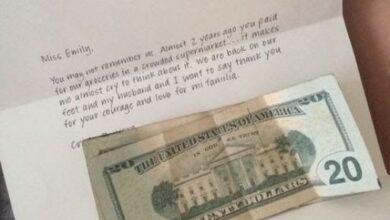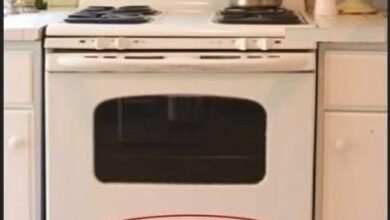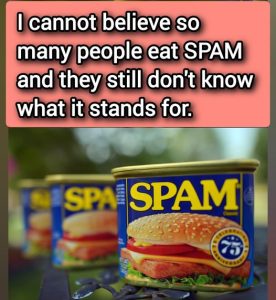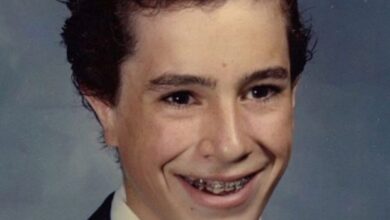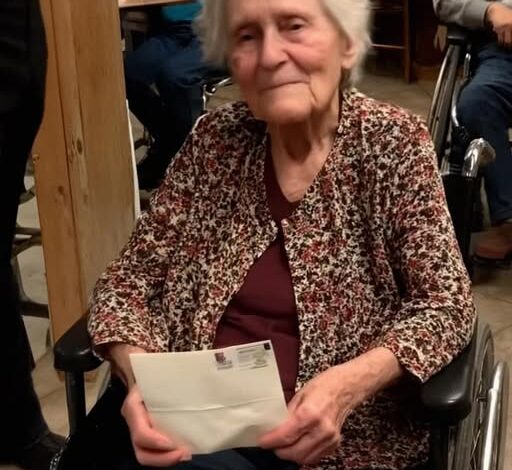
I Gave My Grandson Just a Few Dollar Bills After He Abandoned Me in a Nursing Home — He Was Shocked by the Note I Included
I’m 74, and I live in a nursing home my own grandson dumped me in after tricking me into selling my house for his “girlfriend’s surgery.” Years later, when a surprise inheritance turned my life upside down and he came crawling back for “his share,” I handed him fifty dollars and a message written across those bills that forced him to choose: spend a year working here as a low-paid caregiver… or lose every cent forever.
My name is Gloria. I’ve been a widow for more than twenty years, and I never imagined I’d be telling this kind of story—least of all about the boy I once called my second chance at family.
My daughter Elaine died the day she gave birth to her only child. She never even saw his face. Her husband, Wayne, stumbled into the funeral late, smelling like smoke and cheap liquor, and asked more questions about insurance money than about his newborn son. Not long after, he drifted out of our lives the way stains fade from a shirt—you stop seeing them, but you remember they were there
By the time Todd turned twelve, grief and neglect had already carved deep grooves into him. There were fights at school, stolen phones, teachers calling about “behavioral problems.” Eventually a judge looked over the top of his glasses at me and said, “This boy needs help. Are you willing to take him?”
I said yes before he’d even finished the question.
I moved Todd into my late husband’s little brick house with the peeling white fence and tried to build something steady out of all the broken pieces. I worked nights at a laundromat, scrubbed offices on weekends, and did everything I could so there would always be food in the pantry, clean clothes in his drawers, and a warm bed waiting. I went to every parent-teacher meeting, every game, even when he never left the bench. I checked his homework, sat in the living room until curfew, and told my friends, “Todd’s my second chance at family. He’s my everything.”
For a while, I believed love and effort could fill in all the cracks grief had left behind.
Somewhere between his eighteenth birthday and my own creeping into old age, I lost him. He moved out—first to friends’ couches, then girlfriends’ apartments, then places I never heard about. Text messages replaced visits. He would breeze through every few years, staying just long enough for a quick cup of tea and whatever gift I had waiting: socks I’d knitted, a sweater that matched his eyes, something small wrapped up in leftover Christmas paper.
He’d flash a distracted smile, pocket the present, kiss my cheek, and be gone before I could ask about his life. After the door clicked shut, the house always felt too big. I’d wash his untouched cup slowly, fold the napkin he never used, and tell myself he was simply busy. That’s how young people are now, I’d think. It’s the city. The internet. His friends. Anything but the possibility that he just didn’t care.
Then, one gray afternoon, the doorbell rang and there he was—older, thinner, restless in a way that made my stomach knot. A woman sat waiting in the car, engine running, sunglasses on.
Todd came in and perched on the edge of my sofa like he might spring up at any moment.
“Grandma,” he began, eyes skittering away from mine, “I need your help. Natasha needs an operation. I’ve run out of money. Could you maybe give me something so she can have the surgery?”
I’d heard him lie before, little-boy lies about broken windows and missing homework. This was different. The word “operation” hit me like a cold wind, tangled up with the memory of hospital lights over Elaine’s still face.
“Is she very sick?” I asked. “Have you talked to her parents?”
He swallowed, shook his head, and spun out a jumble of details that didn’t quite hold together, but I wanted to believe him. I wanted to believe I could finally be useful to him again. My savings weren’t much, but the house was worth something. He said selling it was the only way. That it was “our only option.”
I signed the papers and sold my home.
I told myself it made sense—I would move in with Todd and Natasha, we’d share expenses, and maybe this would finally pull us together under one roof as a proper family. I packed up decades of life into boxes, donated furniture, wiped my tears as I said goodbye to my husband’s old armchair and the wallpaper I’d picked in the 70s. When Todd arrived in a used sedan and loaded my suitcases, I felt a flicker of hope I hadn’t allowed myself in years.
The apartment they shared was cluttered, cramped, and smelled faintly of stale takeout and cheap cologne. I called it “cozy” and set about scrubbing it into something closer to a home. I cleaned the kitchen until the counters shone, aired out the rooms, stocked the fridge with vegetables instead of pizza boxes. Natasha watched me with a smile that never reached her eyes. Todd called me a lifesaver whenever dinner appeared at six and his shirts reappeared folded in his closet.
Usefulness has always been the way I justified my place in other people’s lives. So I cooked, cleaned, and tried not to listen too closely to the uneasy feeling in my chest.
Three weeks went by. No hospital appointments. No prescriptions. No paperwork on the table. Instead, Natasha had new outfits. There was a brand-new television. I noticed glossy travel brochures for beach resorts mixed in with the junk mail.
When I asked how she was feeling, she’d touch her stomach and sigh dramatically before changing the subject.
One afternoon, I was on the balcony watering their wilted plants when I heard voices drifting from the open sliding door behind me.
“I cannot wait to get rid of her,” Natasha said, her voice flat and cold. “She’s such a burden. She doesn’t work, she just sits there reading her sad little books and judging us.”
My hand tightened around the watering can. I didn’t move.
Todd’s voice came next, low and smooth. “Relax. Once she’s out of the way, we can finally enjoy ourselves. Hawaii, remember? First trip. No interference. We didn’t drag her here just to babysit us forever.”
They laughed together.
Out on that balcony, with fifty years of abandonment and effort sitting heavily on my shoulders, I felt something inside me crack. The house I sold, the life I left behind—none of it had been for an operation. They wanted money, freedom, and an easy way to shrug me off without having to say it out loud.
I dried my eyes, went back inside, and pretended not to know.
A week later, Todd announced we were going for a drive to “check out a nice place.”
I knew where we were going before we pulled into the parking lot and I saw the tasteful sign and the manicured shrubs. A nursing home.
They gave me a tour and a brochure, spoke in soft, soothing tones about activities and community. All I saw was the door closing behind us.
In the room they assigned me, Todd put my single suitcase down at the foot of the bed and kissed my forehead.
“Don’t worry, Grandma,” he said. “I’ll visit every week. You’ll love it here. They’ve got bingo and everything.”
He sounded like he was dropping a child off at camp. Weeks turned into months and then into years. His promised weekly visits stretched out into holidays, then nothing at all.
I won’t lie and say the nursing home was awful. It was clean, the food edible, the staff kind. Sophie, my favorite aide, always took a little extra time to fix my hair or ask about my day. I learned the stories of the other residents. Our world shrank to four walls and a small courtyard, but it was still a world.
Then, one morning, the director came into my room holding an envelope like it might break if she gripped it too hard.
“Gloria, you’ve received some news,” she said. “Good news.”
My hands trembled as I opened the letter, expecting maybe a bill or a notice about my health insurance. Instead, I learned that my cousin Donovan—wild, unreliable Donovan—had passed away and left me a fortune. Land. Investments. Money that didn’t look real with all those zeroes next to my name.
I sat on my bed, the letter open in my lap, and thought: Todd will come. Of course he will. He may not have been there for birthdays or Christmas, but news like this spread faster than anything else in our family.
I didn’t have to wait long.
Within two weeks, Todd walked into the lobby wearing an expensive jacket and the same restless energy. Natasha wasn’t with him. I imagined she had her hands full with whatever they’d already bought.
“Grandma!” he said, hugging me with an enthusiasm that felt thin and practiced. “I heard about Donovan. I’m so happy for you.”
He didn’t waste time.
“Listen, I wouldn’t ask, but Natasha needs another operation,” he said, slipping easily into the old script. “Could I get my share early this time? Just a portion, so we can get her into the hospital.”
I looked at his face, searching for some trace of the little boy I had raised. All I saw was calculation.
“Todd,” I said calmly, “I can help you. But not today. The lawyers are still sorting things out. Come back next week. I’ll meet with them, and we’ll do everything in cash so it’s simpler.”
His eyes lit up. He squeezed my hands and called me an angel. Then he left, probably already spending an inheritance he hadn’t yet received.
After he walked out the door, I asked Sophie to wheel me down to the little room where the volunteer lawyers met with residents. I told the young attorney everything: how I sold my house, the fake surgery, how I ended up here. Saying it aloud hurt, but it also cleared something in my head.
We rewrote my will.
If Todd refused my condition, every cent of Donovan’s inheritance would go to the nursing home—to the staff, to better equipment, to the people who had actually treated me with care. If he accepted, he would receive his share only after spending one full year working here as a caregiver. No shortcuts. No disappearing halfway through. One year on the floor, helping feed residents, cleaning rooms, changing linens, listening to their stories. One year learning exactly what it felt like to be seen as a burden.
When the lawyer finished, I asked for fifty dollars in small bills.
Back in my room, I sat at the little desk, spread the notes out, and with a shaky hand, wrote a part of a sentence on each bill. Together, they formed the last lesson I knew how to give.
The next week, Todd came back, right on time. He walked into the common room smelling of aftershave and anticipation.
“So,” he said, rubbing his hands together, “are we all set?”
The other residents pretended to keep reading their magazines and playing cards, but I could feel their eyes on us.
I handed him an envelope. His fingers tore into it before I could say a word.
He stared down at the fifty dollars. His face changed—confusion, then anger.
“Fifty dollars?” he snapped. “Grandma, where’s the rest? Stop joking. I know how much Donovan left you.”
He looked closer at the bills, noticing the writing. He smoothed one out.
His lips moved as he read the words I’d written, slowly, bill by bill, his own voice carrying the message across the room.
“Todd… you know I love you,” one bill began. “But you’ve forgotten how to care for anyone but yourself. Money won’t buy you love, respect, or peace. If you want your inheritance, there is only one way.”
Another bill continued: “You must work here, in this home, for one full year. You must feed the residents, clean their rooms, listen to their stories, and learn to see them as human beings, not burdens.”
The last bills finished: “If you complete the year and the staff agrees you tried, the lawyers will release everything meant for you. If you refuse, the nursing home inherits it all, and you receive nothing. The choice is yours.”
The room went quiet. Todd stood in front of me, fists clenched around those marked bills, cheeks flushed.
“You can’t be serious,” he said. “You expect me to babysit old people for a year just to get what’s mine? That’s insane.”
I met his eyes. “What’s yours, Todd? Money from a man you barely knew? From a woman you barely visit?” I shook my head. “This isn’t punishment. It’s a mirror. You can look away if you want.”
“It’s my inheritance,” he shot back.
“It’s my cousin’s gift,” I said softly. “And my decision. You’re not entitled to it. You’re being offered a chance to earn it—and maybe find something in yourself you lost a long time ago.”
For a moment, I saw something flicker in his expression—anger, hurt, maybe shame. He shoved the envelope into his pocket, muttered something under his breath, and walked out.
I honestly thought that was the last I’d see of him.
But two days later, he came back.
He looked like he hadn’t slept. His hair was a mess, his jaw tight. He sat down heavily in the chair beside my bed.
“Fine,” he said. “I’ll do it. One year. Then I’m done.”
The administrator hired him as a trainee aide. I watched from my doorway as he learned how to change sheets without disturbing fragile bones, how to help someone to the toilet with dignity intact, how to spoon soup slowly into hands that shook more than they held.
At first, he moved like a man serving a sentence. He kept his distance, did the minimum, looked at the clock as if it were taunting him.
Then, almost imperceptibly, things began to shift.
One afternoon, I saw him playing cards with Mr. Alvarez, laughing at some terrible joke. Another day, he stayed after his shift to sit with Mrs. Greene, who was in pain and scared, holding her hand and listening as she told the same story three times in a row. He fixed Sophie’s broken watch in the hallway, unasked. He started dropping by my room just to talk—not about money, but about his day, about the people he was helping, about how hard and strangely satisfying it all was.
By the time the year was up, the man sitting beside my bed did not look like the stranger who had once left me here and vanished. He looked… tired, gentler, more settled. Human in a way he hadn’t allowed himself to be for a long time.
When the lawyer returned with the final documents, Todd didn’t lunge for them.
He looked at me first.
“I want to do this right, Grandma,” he said quietly. “If you still think I deserve it.”
For the first time in many years, I believed he might.
The money was never the real inheritance I wanted him to have anyway.
